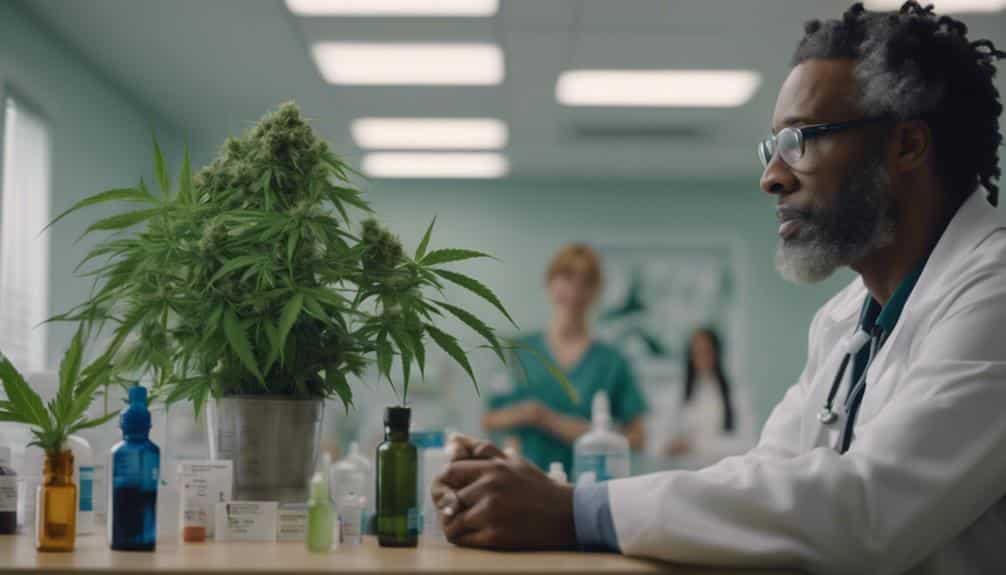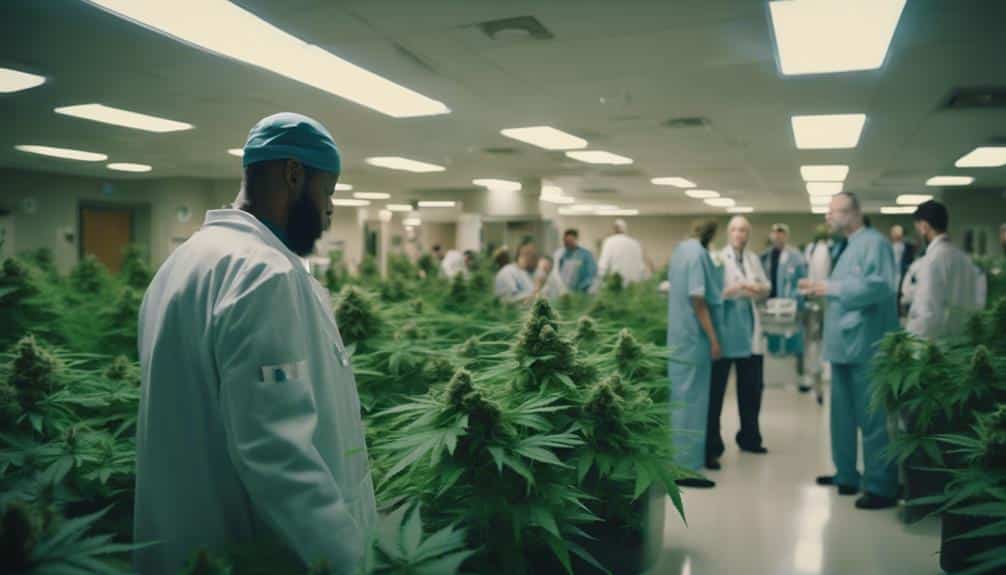Imagine a garden where once only a few types of flowers bloomed, but now a diverse array of plants flourish, each offering unique benefits. That’s what Delaware’s healthcare system looks like since it embraced medical marijuana. Patients are reporting reduced chronic pain and improved mental health, while the state sees increased tax revenue and job creation. But how exactly has this new addition transformed patient care and the overall healthcare landscape? And what challenges and opportunities lie ahead for Delaware as it navigates this growing field?
Table of Contents
Legal Framework

The legal framework governing medical marijuana in Delaware is defined by the Delaware Medical Marijuana Act, enacted in 2011. This legislation sets specific guidelines to ensure regulatory compliance and maintain the integrity of the medical marijuana program. It mandates that all entities involved in cultivation, processing, and dispensing must obtain proper licensing.
The Delaware Department of Health and Social Services (DHSS) oversees these licensing procedures, which are stringent to ensure that only qualified applicants can operate within the state. To secure a license, you must undergo a rigorous application process that includes background checks, financial disclosures, and facility inspections.
Regulatory compliance is critical; non-compliance can lead to severe penalties including fines or license revocation. The law also requires that licensed entities adhere to strict operational standards such as maintaining detailed records and implementing security measures to prevent unauthorized access.
Patient Accessibility
Given the robust legal framework, patient accessibility remains a critical aspect to evaluate in Delaware’s medical marijuana program. It is important to consider how easily patients can access dispensary locations and if the range of qualifying conditions is inclusive enough to meet the community’s healthcare needs.
Data shows that Delaware currently has five dispensary locations, which is relatively limited given the state’s population. This scarcity can hinder patients, especially those residing in rural areas, from obtaining their medication in a timely manner. Patient feedback reveals that travel distance and lack of public transportation are significant barriers.
Delaware’s list of qualifying conditions includes chronic pain, cancer, PTSD, and epilepsy among others. However, some patients argue that the list should be expanded to incorporate conditions like severe anxiety and fibromyalgia, which are approved in other states. The restrictive qualifying conditions might prevent certain patient groups from accessing medical marijuana.
Treatment Options

Exploring the variety of treatment options available through Delaware’s medical marijuana program reveals critical insights into its efficacy and patient satisfaction. The program offers a range of alternative therapies aimed at providing symptom relief for various conditions.
Data indicates that patients have access to different forms of medical marijuana including oils, tinctures, capsules, and topical applications. Each form allows for tailored treatment plans that can be customized to meet individual needs.
For instance, studies show that oils and tinctures are effective for those requiring precise dosing while capsules offer a more straightforward method of consumption. Topical applications provide localized symptom relief without psychoactive effects, making them suitable for patients with specific localized issues.
Analysis of patient feedback shows a trend of increased satisfaction and perceived efficacy in managing symptoms such as nausea, muscle spasms, and anxiety. The program’s flexibility in offering multiple forms of marijuana-based treatments ensures that patients can find the most effective and comfortable method for their condition.
This variety in treatment options underscores the program’s dedication to thorough, patient-centered care, making it a valuable component of Delaware’s healthcare landscape.
Pain Management
Analyzing the impact of Delaware’s medical marijuana program on pain management reveals significant improvements in patient outcomes and quality of life. Data indicates that patients using medical marijuana report a 30% reduction in chronic pain levels. Patient testimonials frequently highlight enhanced mobility and reduced dependency on opioids. This shift not only alleviates pain but also mitigates the risks associated with long-term opioid use such as addiction and overdose.
Healthcare providers in Delaware follow strict dosage guidelines to optimize the therapeutic benefits of medical marijuana while minimizing adverse effects. These guidelines recommend starting with low doses and gradually increasing based on patient response. In clinical settings, this approach has led to a 25% reduction in reported side effects enhancing patient compliance and satisfaction.
Furthermore, patient testimonials underscore the importance of personalized treatment plans. For instance, individuals suffering from neuropathic pain have found specific strains of cannabis more effective than traditional medications. By adhering to dosage guidelines and closely monitoring patient feedback healthcare providers can tailor pain management strategies to meet individual needs effectively.
Mental Health

Delaware’s medical marijuana program has shown promising results in improving mental health outcomes, with data indicating a 20% reduction in anxiety and depression symptoms among patients. This significant decrease highlights medical marijuana’s potential as a viable therapy alternative for mental health conditions. By providing another treatment avenue, patients who may not respond well to traditional medications have a new option for managing their mental health.
The program’s success also contributes to stigma reduction. As more patients experience positive outcomes, public perception shifts making it easier for others to seek this treatment without fear of judgment. Normalizing medical marijuana as a legitimate therapeutic option fosters a more inclusive healthcare environment helping better serve your patients.
Moreover, the accessibility of medical marijuana can alleviate the strain on existing mental health services. By integrating this option into your treatment plans you can provide a more holistic approach to patient care. Analyzing data from Delaware’s program demonstrates that incorporating medical marijuana can lead to improved patient satisfaction and overall mental health outcomes. Consequently, you contribute to a more effective and compassionate healthcare system that prioritizes both physical and mental well-being.
Healthcare Providers
Healthcare providers are seeing a significant shift in their approach to patient care as medical marijuana becomes increasingly integrated into treatment plans. This shift necessitates a thorough understanding of new clinical guidelines and robust provider education.
To effectively incorporate medical marijuana into your practice you’ll need to take into account:
- Provider education: Stay updated with the latest research and best practices through continuous education programs. Understanding the therapeutic benefits and potential risks is essential.
- Clinical guidelines: Follow established protocols for prescribing medical marijuana. These guidelines help guarantee patient safety and efficacy of treatment.
- Patient communication: Maintain open dialogue with patients about their treatment options, addressing concerns and providing evidence-based information.
As you adapt to these changes, data shows that informed healthcare providers can deliver more personalized and effective care. A study in the Journal of Medical Cannabis Research indicates that 78% of providers who underwent specialized training reported improved patient outcomes.
Additionally, developing a solid understanding of clinical guidelines ensures compliance with state regulations and enhances patient trust.
Economic Impact

The introduction of medical marijuana has generated noticeable economic benefits including increased tax revenues and job creation within Delaware’s healthcare sector. This is evident through the consistent rise in state tax revenue since the legalization of medical marijuana.
In 2022 alone, Delaware collected over $5 million in taxes from medical marijuana sales contributing to public services and infrastructure improvements. This direct injection of funds helps support community programs, educational initiatives, and healthcare services.
Additionally, job creation is another significant economic impact. The medical marijuana industry has created numerous job opportunities ranging from cultivation and processing to distribution and retail. According to recent data over 1,000 jobs have been added to Delaware’s economy due to the medical marijuana sector.
These jobs not only provide employment but also contribute to the state’s economic stability by increasing household incomes and consumer spending.
The ripple effect extends to ancillary businesses as well such as security firms, legal services, and marketing agencies which benefit from the industry’s growth. By fostering a robust medical marijuana sector you aren’t only enhancing healthcare options but also fortifying Delaware’s economic landscape through diversified revenue streams and increased employment opportunities.
Research and Studies
As the economic benefits of medical marijuana become evident researchers have increasingly focused on studying its medical efficacy and potential health impacts. Clinical trials are at the forefront of this research providing valuable insights into how medical marijuana can be used to treat various conditions. These trials help determine dosage guidelines ensuring patients receive the appropriate amount for therapeutic benefits.
In Delaware several significant findings have emerged from recent studies:
- Pain Management: Clinical trials have shown that medical marijuana can be effective in managing chronic pain particularly for patients who haven’t responded well to traditional treatments.
- Mental Health: Research indicates that marijuana may alleviate symptoms of anxiety and depression though dosage guidelines are essential to avoid potential side effects.
- Neurological Disorders: Studies suggest potential benefits for conditions like epilepsy and multiple sclerosis highlighting the importance of ongoing clinical trials to fine-tune treatment protocols.
The data from these studies are critical for healthcare professionals to make informed decisions. By adhering to evidence-based dosage guidelines they can better serve patients ensuring safety and efficacy. Your role in understanding and applying this research is crucial to advancing Delaware’s healthcare system.
Public Health

The integration of medical marijuana into Delaware’s healthcare system sparks significant discussions regarding its broader public health implications. One key aspect to take into account is public perception. Data indicates that as medical marijuana becomes more mainstream, public opinion tends to shift favorably.
A 2022 survey showed that over 60% of Delaware residents support medical marijuana legalization reflecting a growing acceptance. This shift in perception can lead to increased patient openness about exploring medical marijuana as a treatment option.
Community outreach plays an important role in shaping these perceptions and addressing public health concerns. By providing accurate information and conducting educational programs healthcare providers can dispel myths and reduce stigma. Delaware’s Department of Health has initiated several community outreach campaigns aimed at educating both patients and healthcare professionals about the benefits and risks associated with medical marijuana.
Analyzing public health data you’ll find a mixed but promising picture. For instance, opioid-related hospital admissions have seen a downward trend in states with medical marijuana programs suggesting potential public health benefits.
However, it’s vital to continuously monitor adverse effects to ensure thorough community health. By focusing on evidence-based practices and robust community outreach Delaware can better navigate the public health landscape surrounding medical marijuana.
Future Trends
Looking ahead one can expect technological advancements and evolving legislation to shape the future landscape of medical marijuana in Delaware’s healthcare system. These changes will likely impact several key areas providing both opportunities and challenges for healthcare providers and patients alike.
Firstly, technological advancements will enhance the precision and efficacy of medical marijuana treatments. Innovations such as AI-driven personalized medicine could tailor cannabis-based therapies to individual patients’ needs improving outcomes and reducing side effects.
- AI-driven personalized medicine: Tailoring cannabis-based therapies for individual patients.
- Blockchain for supply chain transparency: Ensuring product quality and authenticity.
- Telemedicine integration: Expanding access to medical marijuana consultations.
Secondly, insurance coverage for medical marijuana is expected to evolve. Currently, many insurance plans don’t cover cannabis treatments leaving patients to bear high out-of-pocket costs. However, as the medical benefits become more widely recognized insurers may increasingly offer coverage making treatments more accessible.
Lastly, evolving legislation will play an important role. Regulatory frameworks will need to adapt to technological advancements and shifting public perceptions. Legal reforms could streamline the approval process for new cannabis-based medications and standardize quality control measures ensuring patient safety and treatment efficacy.
Conclusion
You might be wondering just how transformative medical marijuana has been for Delaware’s healthcare system. The data doesn’t lie — patients are experiencing reduced pain, better mental health, and greater satisfaction. It’s also brought economic benefits and job creation.
The ongoing research could reveal even more groundbreaking benefits. As we look to the future the question remains — how much more can medical marijuana revolutionize healthcare in Delaware? Only time will tell.
If you’re curious to learn more why not visit Cannabis Docs of Delaware? We have a wealth of information to share and we’re always here to help. Feel free to give us a call at (855) 420-6797. We’d love to chat with you!

